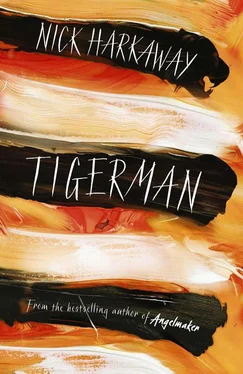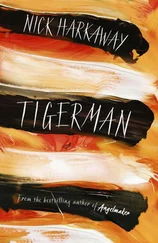The Sergeant wondered what it must be like to see so much appallingly dangerous stuff gathered together in one place, so many strange and expensive tools of destruction and defence, for the first time.
Finally, the boy said: ‘This is not a good room,’ and Lester Ferris thought he would cheer.
‘No,’ he said. ‘It isn’t. But it’s got things in it I might need.’ He knocked on an armoured vest, and sighed.
The boy nodded.
Together, then, they sat with the comics and the inventory list and drew up an outline of how he should appear. They began with words:
dangerous
fiendish
indestructible
monstrous
capable.
The boy proposed also
cannibalistic
but the Sergeant demurred, and the boy in return struck off
professional
as being more something a soldier should be than a caped crusader. They got stuck for a while, and came up with
scary
which was redundant, and
lethal
which made them both uncomfortable, however true it might be that they wanted their creation to seem that way. And then the boy suggested
shocking
and, of course,
awesome.
The Sergeant laid down a few hard rules for equipment, and then withdrew to watch his friend work, bemused by the sketches the boy drew on sheets of paper from the stationery cupboard and by the piles of gear he fetched and discarded from the armoury. Mancreu and even Pechorin, Lester Ferris understood well enough, but it occurred to him now that he did not understand the business of superheroing at all. He knew it as a thing to be admired and as a brief diversion in childhood, but he had never considered it for what it was or how it might actually be done, or even what it might mean if one did.
He was going to put on a funny hat and fight crime. He was going, however briefly, into their world, and you didn’t do that without learning about where you were going. He needed to see the fictional landscape of hopes and aspirations and the characters who inhabited them. Symbolic terrain.
He opened a comic and began to read it the way he read soil and weather.
The first thing he understood in that hour was that it was never about hitting people. It was always about proving a point. Hitting people was just a background, the way a uniform was. The message varied like the soldier. For Superman, that point was about justice and ideals. He really was a perfect American dream. For Batman, it was something else altogether. It was a statement that no matter who you were, how tough you were or how wicked, there were some things you simply could not do. He was not primarily about punishment or even prevention. He was a living cypher, a message that the set of actions which were available to human beings did not include certain crimes, and that line was absolute, made absolute not by him but by what he represented, the human capacity to say ‘no’. They could not be prevented, not every time, but they would be uncovered and they would be punished. The Sergeant found himself thinking about Bosnia, where a war had been fought by the West to achieve exactly that same result, and about Afghanistan, where the nations which had pursued Karadžić and Mladić for their misdeeds had decided that some of those things were acceptable so long as they were done for the right reasons.
The boy asked him to hold something while he marked it in chalk, and the Sergeant put down the comic book and shifted to accommodate the easy pressure of curving lines drawn across his chest and legs. Then he was detailed to cut something along the marks, and found that it was not hard at all. There was even a satisfaction in it, a simple lift in his mood for a simple task unequivocally completed. The boy squinted at his work, and then approved it.
It was very companionable, sitting and making in this way. The Sergeant and his uncle Mike had once made a go-kart together, out of a box crate and some wheels from a discarded perambulator. Mike had insisted at the last minute on adding suspension in the form of bed springs, which had complicated the procedure enormously and resulted in a strange, nauseating ride. All the same, it had been grand. The young Lester had ridden it every day until it tore itself apart. He had not had the knack of reassembling the springs, and the kart had mouldered in a corner of the garage because Mike was living overseas. More than likely it was still there.
The Sergeant found himself wondering whether the boy would enjoy it as much as he had, whether they might repair it together. The warming notion soothed him, and he drifted like a man sleeping in the bath. He considered other things he and the boy might make together: musical instruments, chemical experiments, and even cakes. He had enjoyed cakes, in his earlier life. Somehow you didn’t get much opportunity to make cakes as a sergeant.
‘What you really need,’ the boy said at last as he tied off a thread, ‘is a sign from White Raoul.’
The Sergeant nodded. He knew it was absurd, even a little mad, but it felt like the right thing. The world was being ludicrous at him, so he would be a bit ludicrous back, and he would make that small part of it around him a little better. Call it atonement, perhaps, for being the one to reveal to the boy that adults do not automatically have all the answers, and that justice does not flow like water from people who are taller than a child. If the boy thought he should have a sign from the scrivener, then: good.
So he told the boy that if it could be arranged, he would have such a sign, but that it must be a secret, and the boy said that the scrivener’s calling was like the confessional, that he would die before he told a single one of the secrets he carried in his strange head.
‘God is inside him like the ringer in a bell,’ the boy said solemnly, and when the Sergeant glanced at him — religious faith not being part of his stated world-view — he shrugged and added that people believed all kinds of stuff.
Perhaps this lack of faith was the reason he would not enter the shop. ‘I may not come in,’ he informed the Sergeant as they stood at the door. ‘It is not allowed.’
Much negotiation had been required to secure an audience at such short notice: a rapid-fire telephone discussion in Moitié passing far beyond the Sergeant’s ability to comprehend. There had been a woman’s voice first, sharp and annoyed, and then eventually she had yielded the device to someone else: a man who spoke low and slow, to whom the boy was — if not actually respectful — gentle and wheedling. Then the boy had taken some items from the costume pile and required that the Sergeant drive him to the waterfront and circle the car until called for. Favours were being called in, the Sergeant sensed, and gravest contracts signed. But none of these, it seemed, would bind him personally. The debt would rest with the boy, or perhaps Raoul was discharging some earlier IOU. The boy was stubbornly opaque on the matter, and would only talk about what came next.
‘It is your quest. Your tree on Degobah!’ the boy said. ‘Maybe you meet Darth Vader. Full of evil win!’ He looked worried for a moment, then shook his head. ‘No, no. You meet only White Raoul. I have told him already what he must do for you. I have given him what he needs. He is a crazy old man, maybe also a prophet. Like Hunter Thompson found Jesus, maybe.’
‘With a beautiful daughter,’ the Sergeant muttered.
‘She is ordinary,’ the boy said reflexively, and then he looked away, so the Sergeant immediately wondered whether he was in love.
It would make sense. The boy was an enigma and so was she: Sandrine, the hallowed virgin, secret and perfect. The boy loved winkling out secrets, and it seemed there was no door barred to him. If anyone on the island could fall in love with with the princess in the tower it would be this wolf child, courting her without knowing what he was doing, losing his heart. She would be fifteen years his senior or more: a hopeless, unrequited passion. Or the Sergeant could be seeing things, making up stories like a sad old man.
Читать дальше
Конец ознакомительного отрывка
Купить книгу











